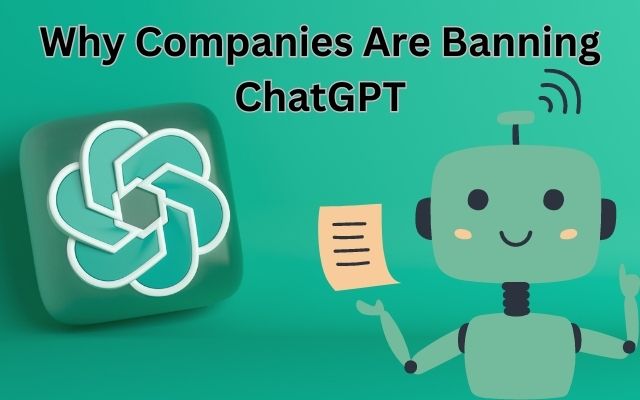Growing Trend: Why Companies Are Banning ChatGPT

The growing trend of companies are banning ChatGPT highlights the concerns and risks associated with its use in various industries. In recent months, an increasing number of companies have made the decision to ban ChatGPT, an AI-powered chatbot developed by OpenAI. While ChatGPT offers impressive capabilities, there are several significant reasons why organizations are choosing to restrict its use. In this article, we delve into the key concerns that have led to these bans and explore the potential risks associated with ChatGPT.
Exploring the Reasons Behind Companies are Banning ChatGPT
Data Leaks:
One of the primary concerns surrounding ChatGPT is the potential for data leaks. As an AI model, ChatGPT requires extensive training data, including user interactions. Companies handling sensitive customer information or trade secrets are wary of sharing such data with external entities. OpenAI’s access to the information fed into the chatbot, combined with a lack of robust data protection measures, raises privacy and confidentiality concerns.
Personalization of chatbots:
To combat the potential risks and inaccuracies of ChatGPT, companies have opted to develop their own AI chatbots. These personalized chatbots leverage internal data and knowledge to provide accurate and tailored responses. By utilizing in-house solutions, organizations can maintain better control over data handling and mitigate the legal and reputational consequences associated with mishandling information.
Cybersecurity Risks:
While the exact cybersecurity risks associated with ChatGPT remain unclear, integrating the chatbot into an organization’s infrastructure may introduce potential vulnerabilities. Cyberattackers could exploit weaknesses in the chatbot’s security system to inject malware or conduct phishing attacks. The ability of ChatGPT to generate human-like responses poses an attractive target for attackers seeking to deceive employees and gain access to sensitive information.
Employees Using Resources Carelessly:
Overreliance on ChatGPT by employees can stifle critical thinking, creativity, and innovation within the workplace. When employees rely solely on the chatbot’s responses without fact-checking or verification, it can lead to inaccurate information being provided to customers or stakeholders. To ensure reliable and accurate solutions, companies are discouraging the overdependence on ChatGPT and encouraging employees to think critically and independently.
Lack of Regulation:
The lack of regulatory guidance for AI language models like ChatGPT poses a significant concern for companies operating in regulated industries. Without clear guidelines, businesses may face legal consequences and challenges in meeting compliance requirements. The absence of regulation also hampers transparency, making it difficult for organizations to explain the decision-making processes of AI chatbots to customers and regulatory authorities.
FAQ
Q: Why are companies banning the use of ChatGPT?
A: Companies are banning the use of ChatGPT due to several reasons. These include concerns over data leaks, cybersecurity risks, the creation of personalized chatbots, the lack of regulation, and irresponsible use by employees.
Q: What is the primary concern regarding data leaks?
A: ChatGPT requires a large amount of data to train and operate effectively. This data, including confidential customer details and sensitive business information, is liable to be reviewed by trainers, posing a risk of data leaks. Organizations are cautious about sharing personal data with external entities and want to ensure compliance with data protection regulations.
Q: What are the cybersecurity risks associated with ChatGPT?
A: While it is unclear if ChatGPT is prone to cybersecurity risks, integrating it within an organization’s systems may introduce potential vulnerabilities. Attackers could exploit these weaknesses to inject malware or engage in phishing attacks. The chatbot’s ability to generate human-like responses also makes it attractive to attackers seeking to deceive employees and obtain sensitive information.
Q: Why are companies creating personalized chatbots instead of using ChatGPT?
A: Companies are creating personalized chatbots to address concerns regarding data reliability and security. By using in-house chatbots based on their own data and information, organizations can have greater control over the accuracy and protection of the data shared with employees and customers.
Q: How does the lack of regulation impact the use of ChatGPT?
A: The absence of clear regulatory guidance surrounding ChatGPT raises concerns for companies, particularly those subject to industry-specific regulations. Without precise conditions governing its use, companies may face legal consequences and find it challenging to explain the chatbot’s decision-making processes and security measures to customers.
Q: How does irresponsible use by employees affect the ban on ChatGPT?
A: Some employees may become overly reliant on ChatGPT, leading to a decrease in critical thinking and creativity. Relying solely on the chatbot’s responses can result in inaccurate and unreliable information being presented to customers. To ensure operational efficiency and accuracy, companies are implementing bans to encourage employees to seek alternative approaches and verify information from reliable sources.
Q: Are there alternative solutions available to ChatGPT?
A: Yes, companies can explore alternatives such as developing personalized chatbots or adopting other AI tools and technologies that align with their specific needs and data security requirements.
Q: What is the overall aim of banning ChatGPT?
A: Banning ChatGPT allows companies to mitigate the risks associated with data breaches, unreliable information, and regulatory non-compliance. It helps them maintain data security, protect their reputation, and ensure responsible usage of AI tools within their organizations.
- How to delete Chatgpt Account
- ChatGPT, but for making videos? Text-to-video generators come close to being a reality
- How to Replace Siri with ChatGPT on iPhone
Conclusion:
As companies prioritize data privacy, cybersecurity, compliance, and employee productivity, the decision to ban ChatGPT has become a growing trend. Concerns surrounding data leaks, cybersecurity risks, the creation of personalized chatbots, the lack of regulation, and irresponsible use by employees have prompted organizations to seek alternatives or limit the use of ChatGPT. While the capabilities of AI chatbots continue to evolve, addressing these concerns will be vital for widespread adoption in enterprise environments.






